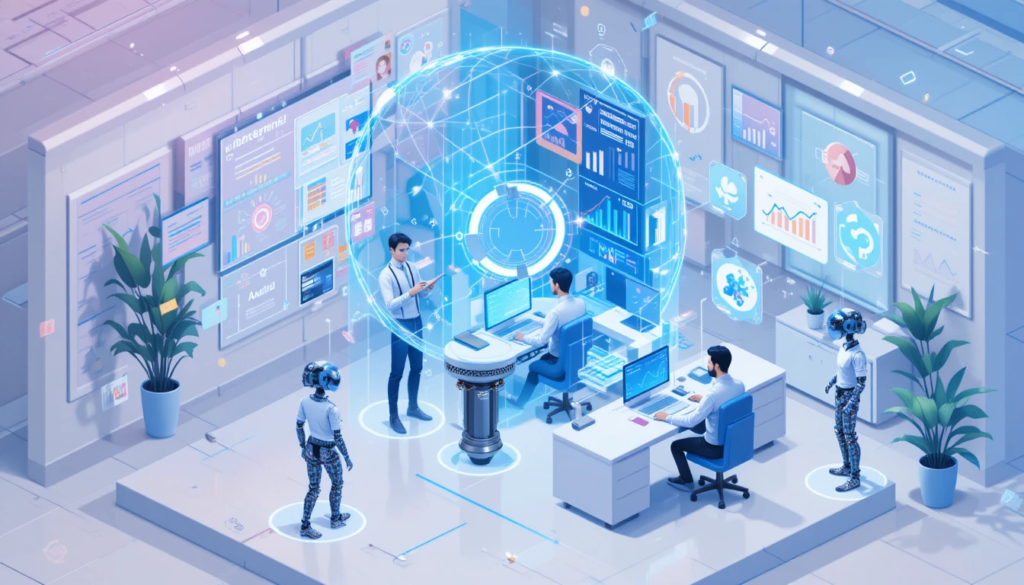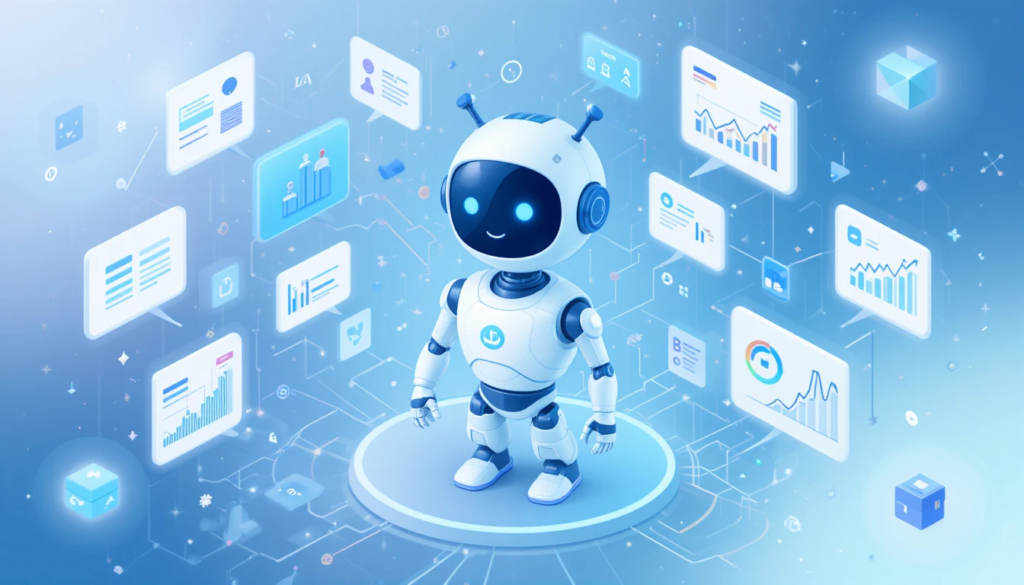
The Future of HR and CRM
With the technology age, companies must become more efficient, increase employee involvement, and deliver individualised customer experiences. The bigger the company, the more difficult it is to keep the employees and the customers. Artificial Intelligence (AI) comes in here to transform the very essence of how companies operate, especially in the HR (Human Resources) and CRM (Customer Relationship Management) systems.
AI is transforming traditional HR and CRM operations, automating mundane work, improving decision-making, and delivering personalised interactions outside the limits of conventional manual processes. How exactly is AI transforming such sectors? How do companies use AI to maximise workforce interaction, automate, and create more compelling customer relationships?
This blog entry provides information regarding the evolution of AI in CRM and HR, its pros and cons, its scope, and ways businesses can drive AI’s application in management.
AI in Human Resources: A Game-Changer in the Workforce
Human Resources (HR) are the backbone of any organisation and carry out recruitment, training, employee motivation, performance management, and employee retention. In the past, all these activities were manpower-based and error-prone. However, AI transforms HR activities into efficient, data-driven, and people-centric activities.
AI for Recruitment and Talent Acquisition
It is perhaps one of the biggest challenges HR professionals face when recruiting and appointing the best personnel. Screening dozens of CVs, shortlisting, scheduling interviews, and making decisions on candidates’ suitability have been energy—and time—consuming tasks.
AI minimises hiring by eliminating mundane tasks and providing more precise hiring options. AI-powered ATS can scan and sift through half a million resumes in seconds and distinguish between candidates based on job needs, work experience, and credentials.
- AI-powered hiring reduces hiring time by 30-50% and increases hiring accuracy by 23%.
- 75% of organisations use AI to automate hiring.
There are issues, though. Some applicants grumble that AI is impersonal and intrusive. For instance, AI robots have scheduled applicants for interviews at firms without openings.
To address this, companies must balance automation and the human touch so that AI supports—and does not replace—human judgment in recruitment.
AI for Employee Retention and Engagement

Once employees are hired, AI becomes a built-in part of employee retention and engagement tactics. Employee turnover is a monster issue, with companies losing billions of dollars yearly due to high turnover.
Artificial intelligence (AI) HR software filters through performance reports, employee attitudes, and staff engagement to identify the most likely to leave. HR organisations can intervene pre-turnover with some required steps through predictive analytics by reversing drivers of exit through upskilling the workforce, mentorship programs, or improved work-life balance schemes.
- Organisations employing AI-powered staff engagement software achieve a 20-30% increase in employee retention rates.
AI also enhances workplace well-being initiatives with customised health guidance, mental well-being tools, and stress management capability, resulting in a healthier, happier, and more productive workforce.
AI for Performance Management and Training
Performance management has gone beyond the classic annual performance review. AI enables performance monitoring through productivity, feedback, and employee collaboration behaviour analysis.
- AI-based performance management software reduces employee burnout by 40% with real-time feedback and individualised development plans.
AI is also transforming corporate learning in much the same way. AI-based learning management systems (LMS) offer employees customised training modules according to their skills, career development needs, and performance levels.
Organisations adopting AI-based learning systems witness a 60% boost in employee skill development.
With automated learning, businesses force employees to acquire new business line knowledge, competencies, and career-building.
AI for CRM: Customer Relationship Management Reinvented
While AI is revolutionising HR, it’s also revolutionising CRM. Today’s customers demand a real-time, frictionless, and hyper-personalized experience, and AI allows organisations to deliver that same experience.
AI-Powered Personalization in Customer Experience
Traditional legacy CRM systems store vast amounts of customer data, but with AI, predictive analytics and machine learning can be used to analyse the data and deliver hyper-personalized experiences.
- AI-driven CRM software improves customer engagement by 40% through personalisation.
For example, AI-based recommendation systems learn a customer’s buying history, behaviour, and interests and suggest products accordingly. Amazon and Netflix, to cite a particular example, recommend products and shows to every individual based on AI.
Similarly, AI-based CRM solutions like Salesforce’s Einstein AI allow businesses to predict customers’ needs and offer personalised solutions in real-time.
AI Chatbots and Virtual Assistants for Customer Support
One of the most significant AI contributions to CRM is the launch of AI chatbots and virtual assistants. The robots answer customer questions 24/7, improving response time and customer satisfaction.
- AI chatbots can answer up to 80% of basic customer questions, reducing support by 30%.
- AI chatbots will deliver over $8 billion in customer service cost savings to organisations by 2025.
Bank chatbots handle account requests, execute transactions, and provide financial guidance—time-saving and increased service efficiency.
AI-Powered Predictive Analytics for Customer Retention

AI enables organisations to examine customer behaviour and predict likely churn. It also allows organisations to identify potential-to-churn customers, implement preventive retention based on purchase history and complaints, and monitor customer behaviour.
- AI-powered CRM companies decrease customer churn by 25%.
Telecom firms, for instance, employ AI to track switchers and give them exclusive offers to keep them from switching.
AI Integration Challenges to HR and CRM
Challenges to the integration of AI, even with all the promises, are:
- Data Privacy and Security: Firms must ensure that the AI-powered HR and CRM systems are law-compliant with GDPR, CCPA, and other data protection systems.
- Biases may be introduced into the data they learn from and operate on, leading to discriminatory customer or recruitment targeting.
- Employee and Customer Skepticism: Most people do not trust AI due to concerns over job loss and data privacy.
Thus, to avoid these threats, companies must provide transparency, maintain human agency, and update AI models periodically.
The Future of AI in HR and CRM
In the coming years, AI in HR and CRM will grow even more prominent, introducing:
- Increased predictive analytics to maximise even more talent and customer management.
- Greater automation of HR operations so that HR teams can focus on employee happiness and innovation.
- Hyper-personalization by AI to make one-to-one marketing in scale a reality.
- Seamless human-AI collaboration, introducing automation with empathetic, human-centric decision-making.
With evolving AI technology, companies integrating AI-based CRM and HR technology will have immense competitive advantage in today’s marketplace.
Final Thoughts
AI is no longer a tool—it’s a people and customer management game-changer. Pioneering companies for AI of people and customers will see enhanced efficiency, heightened engagement, and lasting growth.
Do you need to use AI to manage smarter HR and CRM? Contact Kamil Digital today to learn how AI can transform employee and customer relationships.